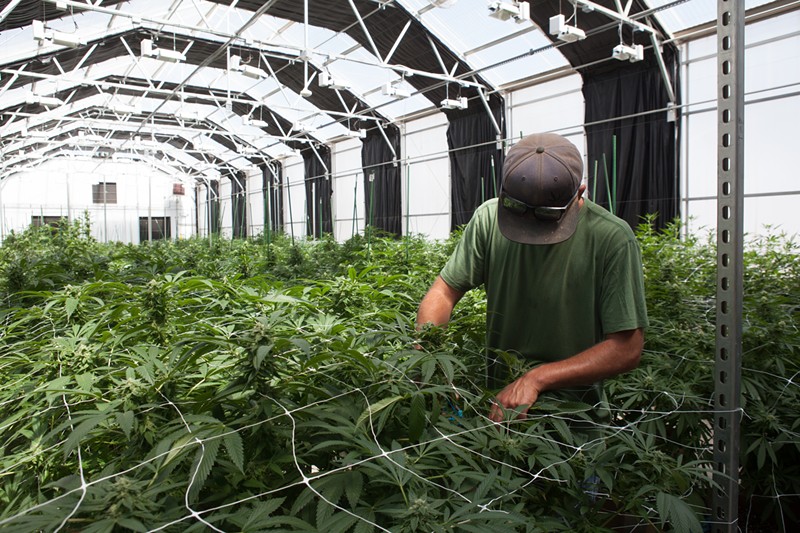Colorado is launching a state-funded loan program for marijuana business owners, one of the first of its kind in the country, according to Governor Jared Polis.
Part of the state's Cannabis Business Office, the new Cannabis Business Loan Program will offer loans ranging from $50,000 to $150,000 for "renovations or expansions, the purchase of equipment, real estate or use as working capital" to established marijuana businesses in Colorado that meet the state's social equity requirements. The loans will have "favorable and manageable terms," according to an announcement from Polis's office, with an estimated 239 jobs created or retained as a result.
“This landmark loan program will create and retain good-paying jobs and promote equity in the cannabis industry by providing growing businesses access to funding. I am committed to saving small businesses money and ensuring our state remains a great place to start and run a business in every industry. Thank you to NuProject for partnering with Colorado on this exciting milestone and working to support innovation in Colorado’s cannabis industry,” Polis says in a statement.
Despite being the first state in the nation to allow recreational pot sales, Colorado has been criticized for not having social equity programs in place earlier for individuals and communities impacted by the drug war. Because the plant is still federally prohibited, small-business owners often struggle to secure lines of credit, loans and other financial services from banks and credit unions. Created in 2021 and financed by state marijuana tax revenue, the Cannabis Business Office has about $1 million allocated for grants and $2.5 million for low-interest micro-loans, according to program manager Tristan Watkins.
The Cannabis Business Office has distributed two rounds of $25,000 and $50,000 grants to new and aspiring marijuana business owners since last July, with over forty businesses as the beneficiaries. The new loans are meant to support "larger, more established businesses," according to the Cannabis Business Loan Program announcement.
To qualify for either program, business owners must have a Colorado social equity marijuana business license, which requires one of the following: They or their families were arrested on certain drug charges, they earn less than 50 percent of the state median income, or they come from a community designated as a low-economic opportunity zone. Applicants must also complete a state-approved technical assistance program and submit a business proposal as part of the process.
The Cannabis Business Office, which is part of the Colorado Office of Economic Development and International Trade (OEDIT), has contracted NuProject, a lender based in Oregon that focuses on small marijuana business loans, to oversee the program. NuProject specializes in finding financing for federally prohibited businesses, according to Polis's office, but this time the funding comes straight from the state government.
“Colorado’s Cannabis Business Loan Program is at the forefront of the cannabis industry, creating a new model to help these small business owners access the resources they need to grow and thrive. Together with NuProject, the Cannabis Business Office is making it possible for cannabis businesses to grow, create new jobs and contribute to a Colorado economy that works for everyone,” OEDIT executive director Eve Liberman says in a statement.
According to OEDIT, the Cannabis Business Project and NuProject will manage the loan program as a revolving fund, with the interest payments reinvested to support future borrowers; the initial $1 million investment is expected to generate $2.9 million in loans over the next ten years
Colorado marijuana social equity advocate and business owner Sarah Woodson applauds the extra funding, but thinks more licensing provisions need to be created at the state level in order to effectively help entrepreneurs from communities impacted by the War on Drugs. She also questions how successful the first two rounds of grants from the Cannabis Business Office have been.
"It would be interesting to see what has happened with the money that has been given out so far. I don't think many of those businesses have opened yet," Woodson says. "All we need is about $370,000 to pass our bill, yet we can't find that."
Woodson is currently pushing the Colorado Legislature to adopt a measure that would allow social equity marijuana delivery services to deliver directly to customers without having to partner with a dispensary. Created seven years after recreational marijuana sales began in Colorado, marijuana delivery licenses have struggled to get off the ground in Denver, which is one of just two cities in the state allowing recreational pot delivery. According to the Denver Department of Excise & Licenses, delivery has accounted for less than one-half of 1 percent of total marijuana sales in Denver since the service began in 2021.
House Bill 1020 has only received two hearings despite being introduced on January 9, the first day of the 2023 legislative session. Woodson says it's been held up both by opposition from established marijuana business owners and a lack of funding to create the new licensing system, which would cost the state just over $360,000, according to HB 1020's fiscal note.
Woodson would like to see that funding come from the Cannabis Business Office. "If there's over $2 million left, then $370,000 shouldn't be an issue. If there's $1 million or less, then that is a different issue," she says, adding that she's preparing a Colorado Open Records request to determine how much money has been spent under the initial grant and loan program.
"The natural nexus is the CBO office, but we want to be respectful of what they have planned. We just want to know how much money is left, and that's not very clear," she says. "We're asking for less than $370,000 for existing businesses to stay in business, many of which were started by the CBO. Social equity is one of the governor's wildly important goals, so we need to get this done."
According to the Cannabis Business Office, $1.25 million has already been dedicated to grants and $1 million has been allotted to loans, with an additional $1 million designated for future grant cycles.
[
{
"name": "Air - MediumRectangle - Inline Content - Mobile Display Size",
"component": "12017618",
"insertPoint": "2",
"requiredCountToDisplay": "2",
"watchElement": ".fdn-content-body",
"astAdList": [
{
"adType": "rectangle",
"displayTargets": "mobile"
}
]
},{
"name": "Editor Picks",
"component": "17242653",
"insertPoint": "4",
"requiredCountToDisplay": "1",
"watchElement": ".fdn-content-body",
"astAdList": [
{
"adType": "rectangle",
"displayTargets": "desktop|tablet"
},{
"adType": "rectangle",
"displayTargets": "desktop|tablet|mobile"
}
]
},{
"name": "Inline Links",
"component": "18838239",
"insertPoint": "8th",
"startingPoint": 8,
"requiredCountToDisplay": "7",
"maxInsertions": 25
},{
"name": "Air - MediumRectangle - Combo - Inline Content",
"component": "17261320",
"insertPoint": "8th",
"startingPoint": 8,
"requiredCountToDisplay": "7",
"maxInsertions": 25,
"watchElement": ".fdn-content-body",
"astAdList": [
{
"adType": "rectangle",
"displayTargets": "desktop|tablet"
},{
"adType": "rectangle",
"displayTargets": "desktop|tablet|mobile"
}
]
},{
"name": "Inline Links",
"component": "18838239",
"insertPoint": "8th",
"startingPoint": 12,
"requiredCountToDisplay": "11",
"maxInsertions": 25
},{
"name": "Air - Leaderboard Tower - Combo - Inline Content",
"component": "17261321",
"insertPoint": "8th",
"startingPoint": 12,
"requiredCountToDisplay": "11",
"maxInsertions": 25,
"watchElement": ".fdn-content-body",
"astAdList": [
{
"adType": "leaderboardInlineContent",
"displayTargets": "desktop|tablet"
},{
"adType": "tower",
"displayTargets": "mobile"
}
]
}
]












